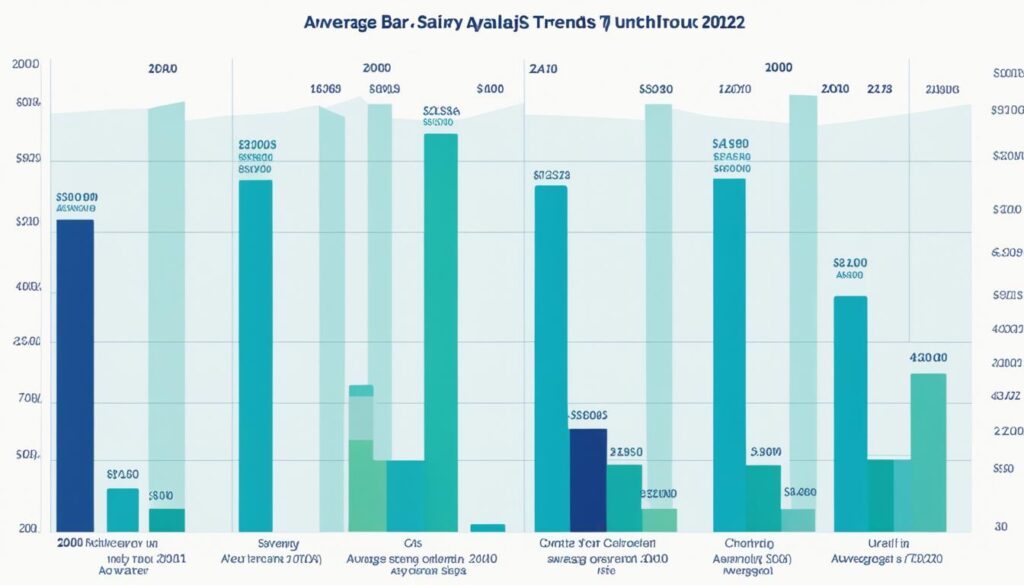The landscape of the Average Salary in the UK is constantly evolving, and understanding the trends for 2025 is crucial for both job seekers and employers alike. With significant shifts in the economic environment and changes in workplace expectations, the UK average wage reflects these developments, making it an essential topic for discussion. Recent data from the Office for National Statistics indicates that the median monthly earnings for January 2025 stand at £2,334, marking a notable 6.4% increase from the previous year, which translates to an annual income of approximately £28,000 before taxes1. Moreover, salary statistics UK reveal how various factors, including regional disparities and one’s level of experience, continue to influence wages across sectors2. This analysis will delve into these varying factors, providing insight into the current pay scale in the United Kingdom, assisting individuals in navigating the evolving job market. For more detailed insights on hiring trends and salary projections, check this resource on salary expectations.
Key Takeaways
- The median salary for all UK workers was £29,669 in 2023.
- Median monthly earnings in January 2025 are projected at £2,334.
- Over half of professionals are considering job changes due to salary dissatisfaction.
- Experience and age significantly affect earning potential in the UK.
- Regionally, salaries vary, impacting average earnings significantly.
- Technological changes continue to shape the job market and salary trends.
Contact us if you are Interested in Buying Property Abroad!
Current Earnings Landscape in the UK
The earnings landscape in the UK presents a dynamic overview, showcasing changes in average salaries and regional variations. Recent wage analysis UK indicates that the average annual salary in the UK is approximately £28,000 before taxes, reflecting ongoing shifts in the job market as the economy recovers post-pandemic3. The typical earnings in Britain have risen, with monthly earnings across the UK averaging between £2,500 to £3,0004. Young workers, aged 18 to 21, earn an average weekly wage of £441, which sums up to an annual salary of £22,9323. In contrast, individuals aged 40 to 49 earn significantly more, hitting a weekly average of £770, translating to around £40,040 annually3.
Overview of Average Earnings
The UK employment scene shows pronounced income benchmark UK differences across various sectors and regions. For example, the ‘London weighting’ often boosts salaries in the capital to address high living costs, making it a prime area for earning potential3. Furthermore, a recent report highlighted that women earn approximately 15-20% less than men in median salaries4, emphasizing ongoing challenges in achieving wage equality.
Regional Variations in Salaries
Regional disparities reveal that the pay scale in the United Kingdom varies widely. London, for instance, consistently offers the highest average pay, benefiting from a competitive job market5. Job seekers outside the capital may find significant differences in offers, often grappling with lower salary statistics UK compared to metropolitan areas, further influencing their earning expectations.
Impact of Experience and Age on Earnings
Experience and age play crucial roles in shaping salary trends in UK employment. Data suggests that earnings generally peak in the 40-49 age bracket, with a noticeable decline as workers transition into retirement or part-time roles3. Additionally, younger workers under 30 are facing a pay gap, earning roughly 25% less than individuals aged 40-495. As professionals climb the ranks and gain experience, they tend to command higher wages, signaling the importance of career development in achieving financial stability.
| Age Group | Weekly Earnings (£) | Annual Earnings (£) |
|---|---|---|
| 18-21 | 441 | 22,932 |
| 40-49 | 770 | 40,040 |
| Average (All Ages) | 617 | 32,164 |
Average Salary in the UK: 2025 Insights

The current landscape of the average salary in the UK reveals insightful trends that reflect the economic climate. Recent salary statistics in the UK indicate that the median average salary stands at £29,669, with median earnings for full-time workers at £34,963 and part-time non-full-time salaries averaging £12,5276. Moreover, the mean average salary is higher, calculated at £35,404 for all workers, with full-time roles yielding an average of £42,2106.
Median Monthly and Annual Earnings Analysis
In terms of monthly earnings, full-time employees earn approximately £2,886, while net monthly average earnings drop to £2,297 after taxes7. Notably, average pay in the UK has increased by 6.8% from 2022 to 2023, reflecting positive trends partially due to inflation recovery dynamics6.
Comparison of Earnings Across Different Age Groups
An analysis of age-related earnings shows substantial variances. Workers aged 18-21 earn an annual salary averaging £20,437, contrasting sharply with those aged 40-49, who enjoy an average income of £39,4916. This clear progression in earnings illustrates the significant impact of age and career progression on typical earnings in Britain6.
Contact us if you are Interested in Buying Property Abroad!
Factors Influencing Salary Trends in 2025

Understanding the wage analysis UK landscape in 2025 requires examining various economic elements and technological shifts that heavily influence salary trends in UK industries. The ongoing cost-of-living crisis remains a crucial factor, alongside government initiatives aimed at easing financial pressures on workers. This interlinkage impacts average pay rates in the UK, demonstrating how wages adapt to changing economic conditions.
Economic Factors Affecting Wages
A variety of economic indicators affect salary trends in UK sectors today. For instance, private sector average weekly earnings grew by 6.1% from November 2023 to January 2025, reflecting a hopeful outlook for employee remuneration amidst challenging circumstances8. Contrastingly, public sector pay growth remains stagnant due to budget constraints, influencing overall wage dynamics. The inflation factor cannot be overlooked, as a 10% wage increase correlated with a 3.2% rise in consumer prices in March 20238.
Technological Advancements and Job Market Shifts
Technology continues to reshape the job market significantly. Sectors like digital technology and renewable energy are seeing enhanced demand for specialized skills, resulting in higher salaries for those who meet these evolving demands. The average monthly salary of a full-time worker in the UK stands at £2,916.66 pre-tax, illustrating how technology influences workforce expectations9. Companies are shifting towards employing candidates who exhibit adaptability and a commitment to continuous learning, which in turn directly influences their earning potential.
In summary, the interplay of economic pressures and technological advancements is pivotal in understanding the evolving salary trends in the UK89.
Employment Insights and Hiring Trends in the UK

The UK labor market has exhibited notable changes as both job seekers and employers navigate shifting dynamics amidst economic fluctuations. Job seeker confidence appears to be influenced significantly by salary expectations, with surveys indicating over half of employees contemplating job changes due to inadequate salaries or benefits. Meanwhile, employers are increasingly willing to adjust compensation packages to attract and retain top talent. The current landscape of the UK average wage reflects these trends, as organizations grapple with fierce competition for skilled workers.
Job Seeker Confidence and Employer Expectations
In the second quarter of 2025, employment in the UK rose by approximately 1.3%, resulting in the recruitment of 386,000 new employees. Despite this increase, the unemployment rate saw a slight uptick from 4.2% to 4.4%, contributing to a pool of nearly 3 million economically inactive individuals prepared to enter the workforce10. This shift indicates a complex interplay between available roles and candidates’ expectations, emphasizing the necessity for businesses to understand current wage analysis UK to remain competitive. Notably, 86% of job seekers reported facing challenges while searching, with low salary offerings being a primary hurdle11.
Industry-Specific Salary Trends and Demands
Analyzing salary statistics UK reveals that sectors like IT, finance, and healthcare have seen varying trends in compensation, underscoring distinct demands across industries. For instance, the finance and business services sector led the way with a notable annual regular growth rate of 6.7% as of March to May 2025, while the construction sector lagged with a rate of just 3.0%12. Moreover, the average salary in the UK spans between £35,000 and £67,000, with discrepancies arising based on specific skill sets and job roles. A considerable 71% of candidates indicated a preference for green jobs, revealing a growing market for sustainability-minded employment10. Understanding these trends not only assists job seekers in identifying their worth but also equips employers with insights necessary to design competitive compensation packages.
Conclusion
The current landscape of the average salary in the UK reveals a complex picture as we approach 2025. Despite challenges stemming from persistent cost-of-living pressures, there are signs of recovery and growth in various sectors, with the average wage for total pay hitting approximately £682 per week, translating to £35,464 annually as reported in March 202513. The income benchmark UK indicates that while the median salary is £31,461, individuals working in high-paying sectors like financial services earn considerably more, averaging £43,821 annually14.
As we analyze the data, it’s clear that the disparity between different regions and professions continues to influence overall earnings. For example, London remains a high-wage area with an average salary of £41,017, contrasting sharply with lower figures in regions such as the North East14. Additionally, educational attainment plays a significant role, with graduates earning an average of £34,000, further outlining the importance of continuous professional development in enhancing salary prospects.
Looking ahead, navigating this intricate terrain will be essential for both employees and employers as the workforce adapts to new realities. Understanding the implications of these statistics and trends will not only influence personal career decisions but also help organizations align their compensation strategies effectively in light of evolving economic conditions. For a deeper understanding of salary dynamics and benchmarks, refer to this resource that offers comprehensive insights into salary comparisons and trends.
Contact us if you are Interested in Buying Property Abroad!
FAQ
What is the average salary in the UK for 2024?
How do salaries vary across different regions in the UK?
What factors influence salary trends in the UK?
How does age affect earning potential in the UK?
What impact has the cost-of-living crisis had on wages?
Are salaries in the UK on the rise for all sectors?
How do technological advancements impact salary expectations?
What trends are currently shaping the job market in the UK?
Source Links
- https://www.reed.com/tools/uk-salary-guide-2024
- https://www.avtrinity.com/uk-average-salary
- https://www.theworkersunion.com/2024/03/08/understanding-the-uk-average-wage-in-2024-insights-and-implications/
- https://www.timecamp.com/average-salary/united-kingdom/
- https://amberstudent.com/blog/post/average-salary-in-the-uk
- https://standout-cv.com/pages/average-uk-salary
- https://blog.emerald-technology.com/average-salary-in-uk
- https://www.cooperhire.io/glossary/average-pay-rise-in-the-uk
- https://www.instarem.com/blog/average-salary-in-uk/
- https://www.linkedin.com/pulse/uk-job-market-2024-key-trends-opportunities-salaries-xavier-augustin-asqec
- https://www.totaljobs.com/recruiter-advice/hiring-trends-index
- https://www.ons.gov.uk/employmentandlabourmarket/peopleinwork/employmentandemployeetypes/bulletins/averageweeklyearningsingreatbritain/july2024
- https://blog.moneyfarm.com/en/financial-planning/average-salary-in-the-uk-what-is-the-average-wage-in-the-uk/
- https://figures.hr/post/average-salary-uk-a-comprehensive-overview

Comments